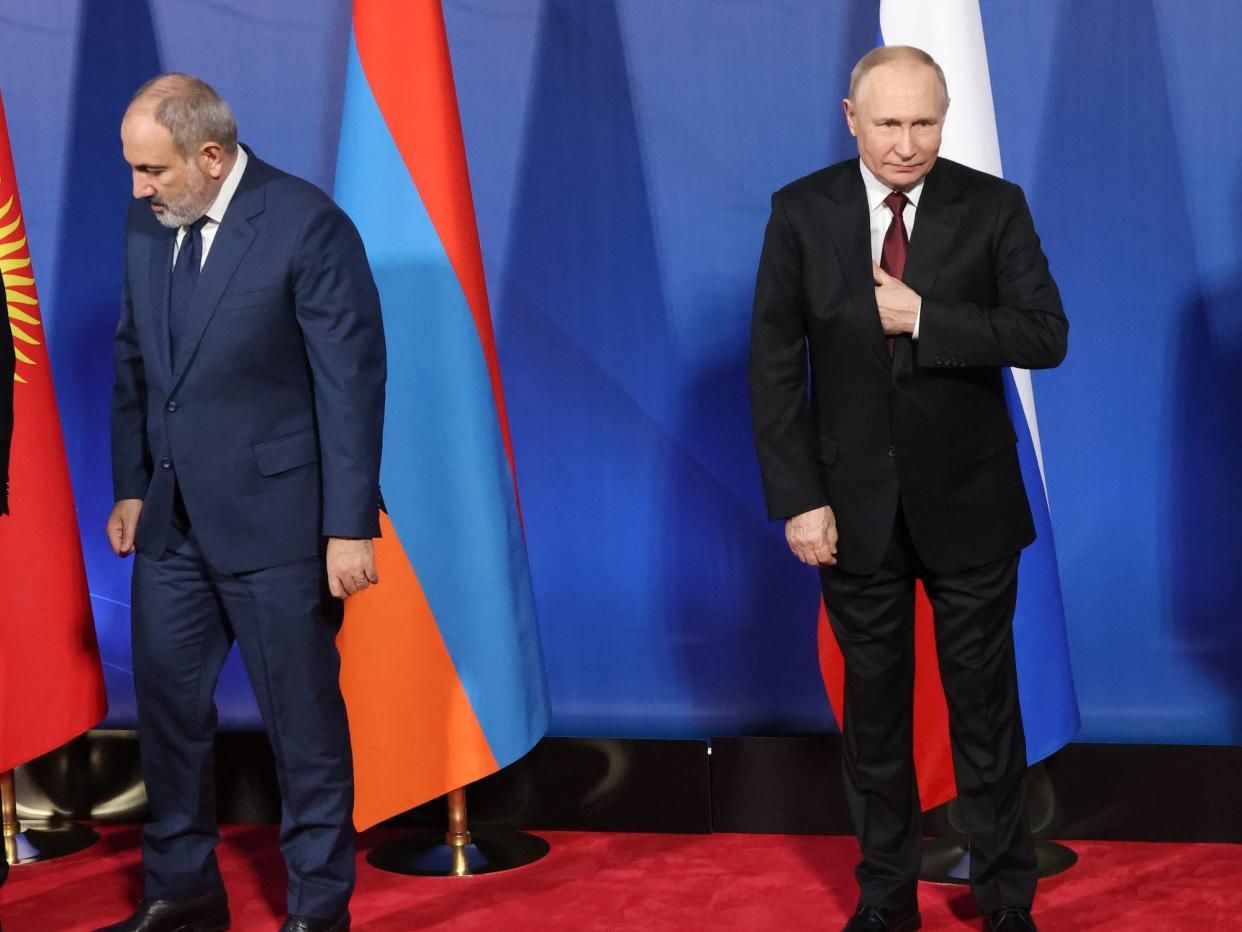A longtime Russia ally suspended participation in Putin's NATO rival after calling it ineffective

Armenia has "frozen" its participation in the Russian-led Collective Security Treaty Organization.
Russia wanted the CSTO to be a NATO equivalent, but in recent years it has been crumbling.
Armenia is a longtime Russian ally, but it has been openly critical and has forged new Western ties.
Armenia, formally a key ally of Russia, has suspended its participation in a Russia-led international alliance, according to its prime minister, Nikol Pashinyan.
The Collective Security Treaty Organization is considered Russia's equivalent to NATO, and Russian President Vladimir Putin hoped it could rival the Western military alliance.
But splinters have emerged in the group since Russia invaded Ukraine, and Armenia has repeatedly challenged its usefulness.
Pashinyan spoke with France24 last week about the CSTO, saying: "The Collective Security Treaty has not fulfilled its objectives as far as Armenia is concerned, particularly in 2021 and 2022. And we could not let that happen without taking notice."
"We have now, in practical terms, frozen our participation in this treaty. As for what comes next, we shall have to see," he said, according to Reuters.
The Kremlin said on Friday that it hadn't received official confirmation that Armenia was leaving the alliance but that it was seeking clarification, The Moscow Times reported.
Pashinyan has frequently expressed frustration with Russia and the CSTO in recent years, accusing the alliance of being ineffective and describing Armenia as no longer an ally of Russia.
Even so, this latest development is a significant one: The countries have long-standing ties, and Armenia was once part of the Soviet Union.
The move also comes as Russia is further isolated from much of the world following its full-scale invasion of Ukraine and is looking to its old allies for support.
Tensions became visible in 2022 when Armenia called on the CSTO for help during border clashes with neighboring Azerbaijan. Russia didn't send troops, infuriating the country's leadership.
Pashinyan said the response was "depressing" and "hugely damaging to the CSTO's image both in our country and abroad."
He then physically distanced himself from Putin in a group photo at an international summit in November 2022.
Months later, Pashinyan said that Armenia could leave the CSTO if its benefits to his country weren't proven.
More snubs followed. Pashinyan canceled military drills with Russia in January 2023, and in September, Armenia announced a joint military exercise with the US.
Pashinyan said in June that his country was "not Russia's ally in the war with Ukraine" and that it felt trapped in the middle between Russia and the West.
Armenia also ordered air-defense systems and radars from France last year. A director at the New Lines Institute told Business Insider that this came as Armenia was attempting to build security ties with NATO.
Pashinyan's criticism deepened as Armenia's security concerns grew last year over fighting in the long-disputed territory of Nagorno-Karabakh. Azerbaijan took control of the territory, driving out thousands of ethnic Armenians.
Russia experts told BI last year that frustrations with Russia had also risen among other CSTO members.
Russia's invasion of Ukraine, as well as its performance in the war, had sparked doubts in those countries over whether Russia could protect them or, indeed, whether they would be safe from Russia itself in the future, the experts said.
But Russia hasn't been left alone on the world stage: It has deepened cooperation with Iran and North Korea since it started its full-scale invasion, and China has continued to give financial support.
The countries turning their back on it, such as Armenia, are also significantly smaller and less powerful than Russia.
Even so, experts told BI the snubs by CSTO members were unwelcome for Putin, who founded the alliance to project power and control.
Jaroslava Barbieri, an expert on Russia and post-Soviet states at the University of Birmingham, said Russia's regional reputation as a security provider had been left "in tatters."
This latest news isn't going to help.
Read the original article on Business Insider


